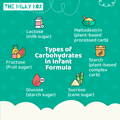If you're curious about the differences between Maltodextrin and lactose, particularly in the context of baby formula, here's a more detailed explanation:
Maltodextrin is a complex carbohydrate derived from starch, such as corn, rice, or potato. It is used as a food additive because it thickens, stabilizes, and sweetens foods.
In baby formula, it acts as a source of carbohydrates, which provides the necessary energy for growth and development. Due to its high glycemic index, Maltodextrin provides fast-acting energy.
Lactose, on the other hand, is a natural sugar found in milk, including breast milk. It is the primary carbohydrate in breast milk and provides a source of energy for infants.
Lactose is a disaccharide consisting of glucose and galactose, with a lower glycemic index than Maltodextrin. This means Lactose takes longer to digest and provides sustained energy over an extended period.
Both of these substances serve as sources of carbohydrates but have different properties and roles in infant nutrition.













